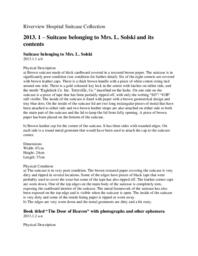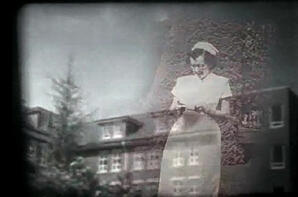Heidi Currie
Person Preferred Name
(none provided) (none provided)
Related Works
Content type
Digital Document
Description / Synopsis
The Riverview Hospital Suitcases finding aid is a descriptive document detailing the condition and physical contents of suitcases previously belonging to three mid-twentieth century female psychiatric patients of the Essondale Asylum / Riverview Mental Hospital (RVH) in Coquitlam, British Columbia. The archiving of the Riverview Hospital Suitcases developed from a series of ethnographic and phenomenologically oriented scholarly projects examining the lived experiences of women working and living in the Provincial Mental Hospital in British Columbia, (BC) during the peak of the psychiatric institutionalization movement in the mid-twentieth century (Nielsen and Currie, 2008, 2010, 2012). The Riverview Hospital Story films (Part 1, Part 2 and Part 3) were originally designed as “art-film” teaching tools for the post-secondary level study of the history of mental health law and policy. As the architect and instructor of the Douglas College Criminology module Canadian Law and the Mentally Disordered Offender, I continued to broaden the historical legal aspects of the course to include the use of a collection of abandoned patient belongings from the same period of institutional life, subsequently referred to as The Riverview Hospital Suitcases. The Suitcase Collection was a further scholarly project whereby three collections of abandoned patient belongings were cataloged, photographed and rehoused following the closure of Riverview Hospital and its volunteer managed ad hoc museum. The academic use of the resources in total, the films and the artifacts, formed a distinctive resource for teaching and learning in psychiatric history. I recognized the pedagogics as much different than traditional teaching on the topic of law and policy, and in criminology more broadly. In making the collection accessible to students, it became apparent that exposure to the collected items had a notable effect on the constructive engagement of students in otherwise remote topics of the “long-ago” mental patient and further, their understanding of the medico-legal practices of the historical asylum hospital. This became the topic of my Doctoral thesis (University of Wales Trinity Saint David) and explored the influence and potential in presenting to learners of law and criminology the tangible evidence of patients as individual persons rather than a homogeneous group of the “insane”. The finding aid provides a specific accounting of the contents of the Riverview Hospital Suitcases. The suitcase collection is historically significant and has value as a research resource for understanding approaches to psychiatric care and the impacts on patients, families and the community. The artifacts are currently in storage with The City of Coquitlam, British Columbia.
Content type
Video
Description / Synopsis
Tells the story of Dr. Ralph Arrowsmith, a mid-20th century psychiatrist with a life-long connection to Coquitlam's Riverview Hospital [formerly Essendale asylum], a mental institution that opened in 1913 and closed in 2011. Dr. Arrowsmith, who was passionate about the psychiatric movement and deeply committed to his patients, recounts his years of practice with frank discussions of the treatment and perception of the mentally ill at the iconic mental hospital, from the peak of the institutional movement through deinstitutionalization. <p>Consciousness is part three of the Riverview Hospital Story Project.</p>
Origin Information
Content type
Video
Description / Synopsis
An interview with nurse Kathleen Clayton Grootendorst, who reflects on her time working at Riverview Hospital in Coquitlam, B.C. Bedlam combines never before seen archival film and photography with present day super 8 footage of the historic Asylum at "Essondale", now known as Riverview Hospital in Coquitlam, B.C. The story of health care worker Kay Clayton unravels to reveal her astonishing personal account of the hospital where she worked during two very different times in mental health history. In 1945, Kay was only 16 years old when she started as a naïve summer relief staff on a large, noisy and crowded women's ward. Kay recounts her experiences on the ward during a time when there was little access to medications to assist in the care of these profoundly ill patients. Kay returned to work in the hospital again in 1973 until her retirement from Asylum care in 1988. The advent of effective psychiatric medications made for considerable advances in patient care with a marked increase in patient liberty. But then, the government introduced the idea of de-institutionalization.
Origin Information
Content type
Video
Description / Synopsis
An interview with nurse Norma McMurdo, who reflects on her time working at Riverview Hospital in Coquitlam, B.C. from 1949 to 1951. Includes compassionate memories of lesbian patients who were not mentally ill. Part One of the Riverview Hospital Project.
Origin Information




